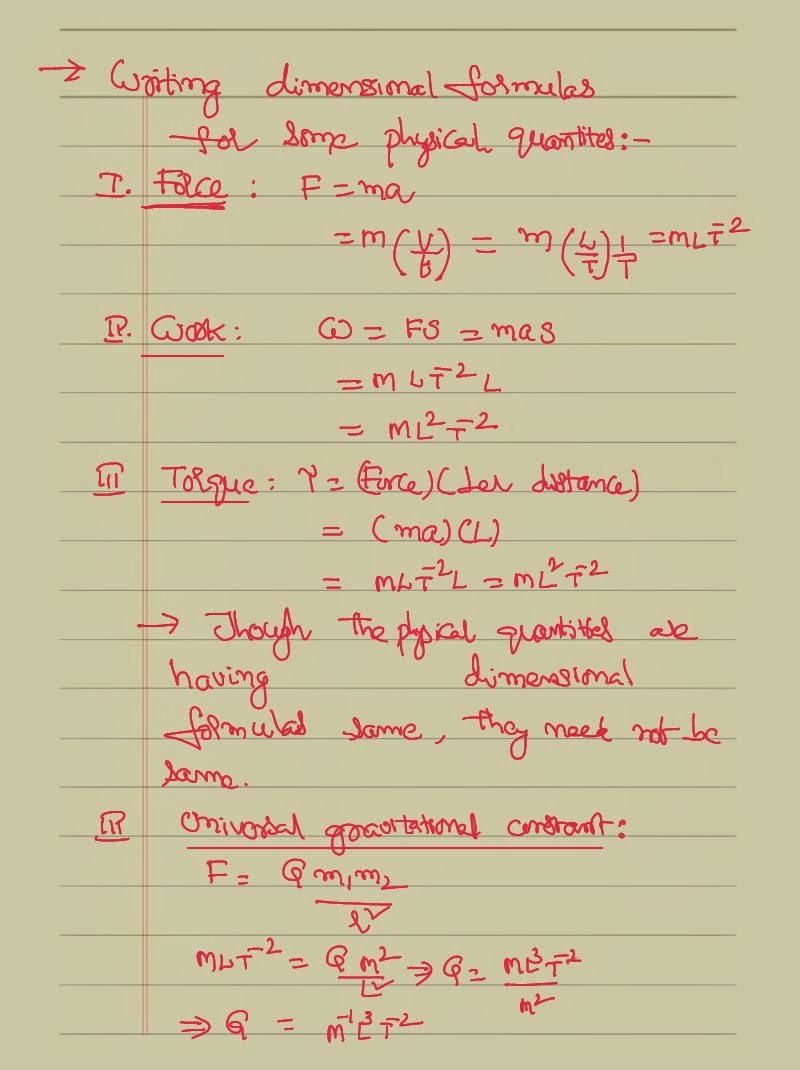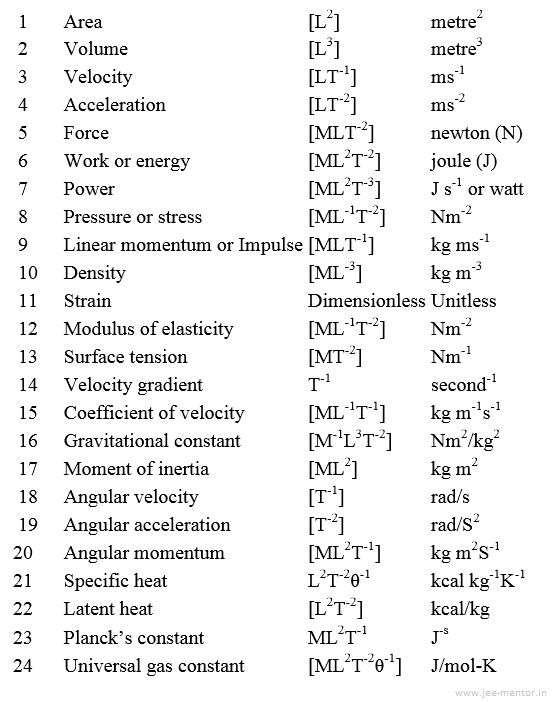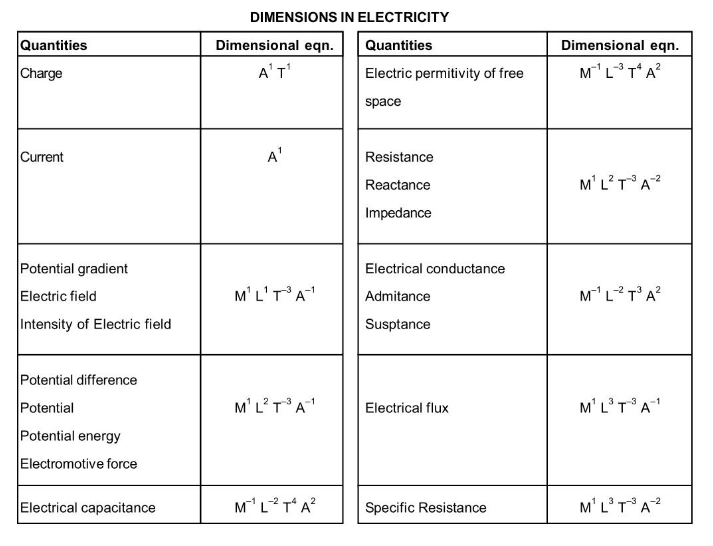
Dimensional formula for a physical quantities and its Uses IIT JEE and NEET Physics
What Is the Dimensional Formula? The dimensional formula of any quantity is the expression showing the powers to which the fundamental units are to be raised to obtain one unit of a derived quantity. If Q is any physical quantity, the expression representing its dimensional formula is given by, Dimensional Formula: Q = M a L b T c

DMR'S PHYSICS NOTES Dimensional Formulae
The necessary conversion factors are given in Table 1.7.1: 1 lb = 453.59 g; 1 L = 1.0567 qt; 1 L = 1,000 mL. We can convert mass from pounds to grams in one step: 9.26 lb × 453.59g 1 lb = 4.20 ×103 g 9.26 l b × 453.59 g 1 l b = 4.20 × 10 3 g. We need to use two steps to convert volume from quarts to milliliters.

DMR'S PHYSICS NOTES Dimensional Formulae
DIMENSIONAL ANALYSIS PHYSICS TUTORIAL - Two methods of writing dimensional formula of any physical quantity with the very good example to understand simply..

SOLUTION Dimensional Formula Physical Qualities Chart Studypool
Table of Content ; In mathematics, dimensions were the measurements of an object's and region's or space's size and even distance in one direction. It is also the measurement of something's length, width, or height.. Dimensional Formula Application. The dimensional formula is useful in the following situations: For any specified.

DMR'S PHYSICS NOTES Dimensional Formulae
In engineering and science, dimensional analysis is the analysis of the relationships between different physical quantities by identifying their base quantities (such as length, mass, time, and electric current) and units of measurement (such as metres and grams) and tracking these dimensions as calculations or comparisons are performed.

DMR'S PHYSICS NOTES Dimensional Formulae
Units and Dimensions - Dimensional Formula Introduction to Units and Dimensions Every measurement has two parts. The first is a number (n), and the next is a unit (u). Q = nu. For example, the length of an object = 40 cm. The number expressing the magnitude of a physical quantity is inversely proportional to the unit selected.

FileDimensional Formula of Some Physical Quantities.png JEEMains PNG Free transparent image
Dimensional Formulae has the following advantages: To check whether a formula is dimensionally correct or not To convert units from one system to another To derive relations between physical quantities based on their interdependence Dimensional Formulae explain how every physical quantity can be expressed in terms of fundamental units

DMR'S PHYSICS NOTES Dimensional Formulae
Dimensional Formulae X = [MaLbTc] Dimensional Formula for Various Quantities The table below provides Dimensional Formulas for different physical quantities: Application of Dimensional Formula Some of the common applications of dimensional formula are: To verify whether a formula is dimensionally correct or not.

3D Geometric Formula Sheet Grade 7 MathClinicplus Tutoring
1 hour has 3600 seconds (Ok mind is steady) 1hr (given in question) * 3600 s/1hr (read as 3600seconds per hour, logically that is correct right?) Now calc the numbers and the units of hours cancel out leaving 3600 seconds. Multiply with speed. 5 m / s * 3600 s The seconds Unit cancels.You are left with 18000m.

Dimensional Formulae and Dimensional Equations Study Material for IIT JEE askIITians
The dimensional formula is a compound expression showing how and which of the fundamental quantities are involved in making that physical quantity. The dimensional equation of a physical quantity is an equation, equating the physical quantity with its dimensional formula.

How to obtain dimensional formula of different Quantities ? eSaral
The dimensional formula of any physical quantity is an equation that explains how and which of the base quantities are contained in that amount. The dimensional formula is written by enclosing the symbols representing base amounts in square brackets with the corresponding power. E.g., the dimensional formula of displacement is [L 1]. A.

Maths4all Formulas of Volume and Surface area of solid figures for class VI,VII,VIII,IX,X,XI
The list of dimensional formula. A useful handout. - Free download as Word Doc (.doc), PDF File (.pdf), Text File (.txt) or read online for free. Remembering the dimensions of physical quantities is an added advantage when it comes to objective type questions. This list will be very useful for the aspirants.

Physics Complete Dimensional Formula List Two
A dimensional equation is an equation derived by equating a physical quantity with its dimensional formula. The dimensional formula for a physical quantity X depends on base dimensions M (Mass), L (Length), and T (Time), Temperature, current electricity, luminous intensity, and amount of substance with respective powers a, b, and c is

Chapter 1 Units and Measurements Physics Derived from
1 Newton = 1 kg m/sec 2 kg → M 1 (Mass); 3 → L 1 (Length); s- 2 → T -2 (Time) ∴ Dimensions of force are [M 1 L 1 T -2] Dimensional formula for some Physical quantities Mechanical equivalent of heat Q16. Write the dimensions of: Impulse, Pressure, Work, Universal constant of Gravitation. Solution: (i) [M 1 L 1 T −1] (ii) [M 2 L 2 T −2]

Dimensional Formula PDF Force Mass
The dimension of any physical quantity expresses its dependence on the base quantities as a product of symbols (or powers of symbols) representing the base quantities.Table \(\PageIndex{1}\) lists the base quantities and the symbols used for their dimension. For example, a measurement of length is said to have dimension L or L 1, a measurement of mass has dimension M or M 1, and a measurement.

12 Physics important formulas and dimensional formula dimesionalformula physics pseb YouTube
Therefore velocity has zero dimension in mass, one dimension in length and −1 dimension in time. Thus the dimensional formula for velocity is [MoL1T−1] or simply [LT−1].The dimensions of fundamental quantities are given in Table 1.4 and the dimensions of some derived quantities are given in Table 1.5. Dimensions of fundamental quantities